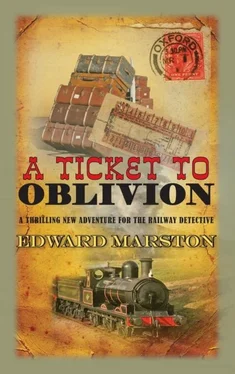Edward Marston - Ticket to Oblivion
Здесь есть возможность читать онлайн «Edward Marston - Ticket to Oblivion» весь текст электронной книги совершенно бесплатно (целиком полную версию без сокращений). В некоторых случаях можно слушать аудио, скачать через торрент в формате fb2 и присутствует краткое содержание. Жанр: Исторический детектив, на английском языке. Описание произведения, (предисловие) а так же отзывы посетителей доступны на портале библиотеки ЛибКат.
- Название:Ticket to Oblivion
- Автор:
- Жанр:
- Год:неизвестен
- ISBN:нет данных
- Рейтинг книги:5 / 5. Голосов: 1
-
Избранное:Добавить в избранное
- Отзывы:
-
Ваша оценка:
- 100
- 1
- 2
- 3
- 4
- 5
Ticket to Oblivion: краткое содержание, описание и аннотация
Предлагаем к чтению аннотацию, описание, краткое содержание или предисловие (зависит от того, что написал сам автор книги «Ticket to Oblivion»). Если вы не нашли необходимую информацию о книге — напишите в комментариях, мы постараемся отыскать её.
Ticket to Oblivion — читать онлайн бесплатно полную книгу (весь текст) целиком
Ниже представлен текст книги, разбитый по страницам. Система сохранения места последней прочитанной страницы, позволяет с удобством читать онлайн бесплатно книгу «Ticket to Oblivion», без необходимости каждый раз заново искать на чём Вы остановились. Поставьте закладку, и сможете в любой момент перейти на страницу, на которой закончили чтение.
Интервал:
Закладка:
‘But it would have saved our daughter’s life!’
‘There’s no need to be so melodramatic.’
‘She’s dead, Marcus. I sense it.’
‘And I have an equally strong feeling that Imogen is still alive,’ he said with far more confidence than he actually possessed.
‘Then where on earth can she be?’ she cried.
‘I’ve engaged the services of the one man who can find her for us.’
‘And who is that?’
‘His name is Inspector Colbeck. He’s being sent here from Scotland Yard.’
‘Do you really think that he can help us?’
‘I’m certain of it,’ he said, sitting up. ‘Because of his unblemished record of success, Colbeck is known as the Railway Detective. Earlier this year, he saved the royal family from being blown up on a train taking them to Balmoral.’
‘Goodness!’
‘Can you think of a better recommendation than that?’
Detective Sergeant Victor Leeming was a realist. He knew that his luck could not last indefinitely. It had given him precious, uninterrupted weeks when he was able to spend every night at home with his wife and two children. Since their investigations had been confined to London, he and Colbeck could go everywhere on foot or by cab. It was a far cry from the cases that had taken them to places like Wales, Scotland and France, separating him from his family in the process. Leeming had revelled in the joy of being back on the territory he knew best. His good fortune had now come to an abrupt halt. Instead of walking through familiar streets in the capital, he was forced to use a mode of travel that he detested. The sergeant found trains noisy, smelly, uncomfortable and potentially dangerous. What made his reluctant journeys even more trying was the fact that Colbeck was always singing the praises of a railway network that had spread all over the country. To him it was a cause for celebration; to Leeming it was a source of unrelieved anguish.
They were an incongruous pair. Colbeck, the dandy of Scotland Yard, was impeccably dressed and sporting a dazzling new waistcoat. He was tall, sinewy and debonair. Leeming, by contrast, looked more like a fairground ruffian than someone involved in law enforcement. He was shorter, stockier, less well proportioned and had a face that was almost intriguingly ugly. While the inspector exuded refinement, the sergeant was unapologetically down to earth. Though his apparel was vaguely similar to that of his companion, it was baggy and crumpled. His top hat had lost much of its sheen. Anyone seeing them for the first time would have identified Colbeck as a member of the gentry with a bodyguard in tow.
The inspector watched the fields of crops and green pastures scudding past.
‘We’d never have been able to get there so quickly by stagecoach,’ he said, turning to his friend. ‘Trains have revolutionised the way that we work.’
‘Not for the better,’ said Leeming, sourly. ‘All that trains have done is to give villains new ways to commit crimes. They’ve blown them up, robbed them, damaged them, assaulted women on them and done all manner of dreadful things. Stagecoaches were far safer and much more reliable.’ He folded his arms. ‘That’s my opinion, anyway.’
‘I respect it, Victor.’
Leeming bristled. ‘Are you mocking me, sir?’
‘I’d never do that.’
Colbeck was sincere. He was too fond of his sergeant to deliberately upset him by poking fun at him. The two detectives were seated alone in a compartment of a jolting train taking them to Worcester. Having set out from London, their first port of call had been Oxford where they’d interviewed both the stationmaster and the porter who’d stood beside Cassandra Vaughan and her daughter awaiting what turned out to be phantom passengers. Neither man could offer any convincing explanation of how the two ladies had disappeared in transit. Unlike the train from London, the one on the OWWR was slow, jerky and inclined to stop at almost every station it came to. As they began to lose speed yet again, Leeming stared hopefully through the window.
‘Have we got there at last?’ he asked.
‘No,’ replied Colbeck, consulting the open copy of Bradshaw in his lap. ‘This will be Moreton-in-Marsh. The station was opened in 1853.’
‘I can live quite happily without that information, sir.’
‘Knowledge is power, Victor.’
‘I’ll take your word for it,’ grumbled Leeming.
‘Travel is an education in itself.’
‘That’s the main reason I prefer to stay in London.’
‘Doesn’t this investigation appeal to you in any way?’
‘Not when it involves spending hours on the railway.’
‘A real challenge confronts us,’ said Colbeck, enthusiastically, ‘and it’s one that’s brimming with interest. In the course of a non-stop train journey of just under sixty miles, two young women disappear as if in a puff of smoke. Surely that fact excites your curiosity?
Leeming grimaced. ‘To be honest, sir, it doesn’t.’
‘Why not, may I ask?’
‘It’s because we both know how this investigation will end.’
‘Do we?’ Colbeck was surprised. ‘Please enlighten me.’
‘Those women must have left the train while it was travelling at speed,’ said Leeming. ‘It’s only a matter of time before their dead bodies are found in the bushes somewhere along the line.’
‘Are you suggesting that they had a bizarre suicide pact?’
‘No, sir — I believe that they fell out by accident.’
‘In that case, the entire train must have been occupied by blind passengers. Evidently, they were also deaf. As the two women tumbled out of their carriage, nobody managed to see them or hear their terrified screams. And then there’s the guard,’ added Colbeck. ‘He’s paid to keep his eyes peeled for anything untoward.’ He pursed his lips. ‘I’m sorry, Victor. Your theory doesn’t hold water.’
Leeming was hurt. ‘What do you think happened?’
‘I prefer to keep an open mind. Strange things happen on the OWWR. It’s no wonder my father-in-law calls it the Old Worse and Worse. But then, of course, he’s biased. Until he retired, he drove locomotives for the LNWR and looks with disdain on rival companies. In his view,’ Colbeck went on, ‘the OWWR had a fatal defect.’
‘What was that, sir?’
‘In its early stages, Brunel was heavily involved.’
‘Mr Andrews has no time for Brunel, does he?’
‘Let’s just say that he’s yet to recognise Brunel’s undoubted genius. I suspect that you’d agree with him on that score, Victor.’
‘People who build railways have ruined this country,’ asserted Leeming.
‘I see them as far-sighted men who are pioneers of progress. The day will come when their achievement is fully appreciated. Admittedly,’ said Colbeck, ‘the development of the railway system has attracted its fair share of rogues, men like George Hudson who sought to exploit it for his own ends and who was involved in all manner of financial malpractice. It remains to be seen if Sir Marcus Burnhope views railways as a priceless national asset or merely as a source of personal income.’
‘Why do you say that, sir?’
‘Read these telegraphs, Victor,’ said the other, extracting them from an inside pocket. Leeming took them and studied each one. ‘What do you notice about them?’
‘They tell us very little about his missing daughter,’ noted Leeming.
‘But they reveal something important about Sir Marcus himself.’
‘Do they?’
‘He’s very frugal with words until we reach his name. Then he feels obliged — in all three cases — to state that he’s on the board of directors of the OWWR.’ Colbeck gave a questioning smile. ‘What sort of man does that?’
Читать дальшеИнтервал:
Закладка:
Похожие книги на «Ticket to Oblivion»
Представляем Вашему вниманию похожие книги на «Ticket to Oblivion» списком для выбора. Мы отобрали схожую по названию и смыслу литературу в надежде предоставить читателям больше вариантов отыскать новые, интересные, ещё непрочитанные произведения.
Обсуждение, отзывы о книге «Ticket to Oblivion» и просто собственные мнения читателей. Оставьте ваши комментарии, напишите, что Вы думаете о произведении, его смысле или главных героях. Укажите что конкретно понравилось, а что нет, и почему Вы так считаете.












